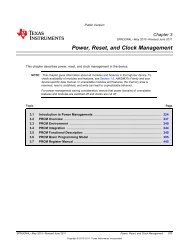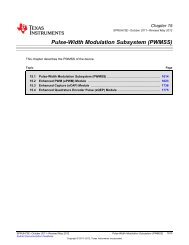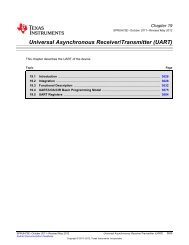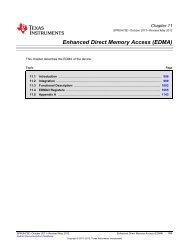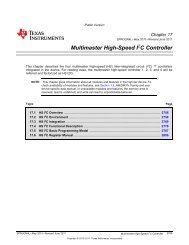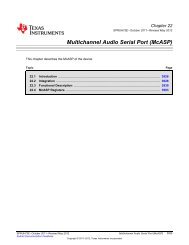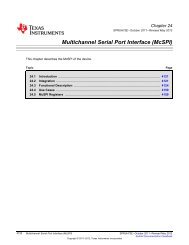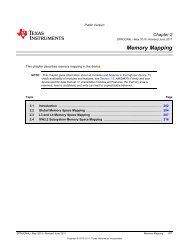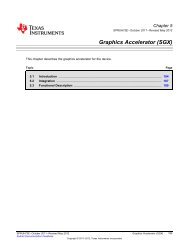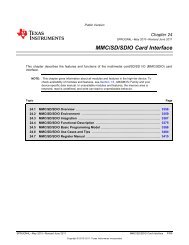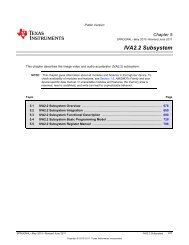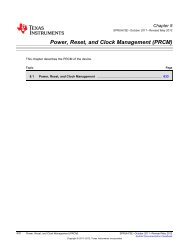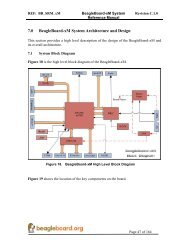Chapter 23 Controller Area Network (CAN).pdf
Chapter 23 Controller Area Network (CAN).pdf
Chapter 23 Controller Area Network (CAN).pdf
You also want an ePaper? Increase the reach of your titles
YUMPU automatically turns print PDFs into web optimized ePapers that Google loves.
Functional Description www.ti.com<br />
<strong>23</strong>.3.18.1 Structure of Message Objects<br />
Table <strong>23</strong>-8 shows the structure of a message object.<br />
The grayed fields are those parts of the message object which are represented in dedicated registers. For<br />
example, the transmit request flags of all message objects are represented in centralized transmit request<br />
registers.<br />
Table <strong>23</strong>-8. Structure of a Message Object<br />
Message Object<br />
Msk[28: MDi<br />
UMask MXtd EoB unused NewDat MsgLst RxIE TxIE IntPnd RmtEn TxRqst<br />
0] r<br />
Data<br />
MsgVal ID[28:0] Xtd Dir DLC[3:0] Data 0 Data 1 Data 2 Data 3 Data 5 Data 6 Data 7<br />
4<br />
Name Value Description<br />
MsgVal Message valid<br />
Table <strong>23</strong>-9. Field Descriptions<br />
0 The message object is ignored by the message handler.<br />
1 The message object is to be used by the message handler.<br />
UMask Use acceptance mask<br />
Note: This bit may be kept at level ‘1’ even when the identifier bits ID[28:0], the control bits Xtd, Dir, or the<br />
data length code are changed. It should be reset if the Messages Object is no longer required.<br />
0 Mask bits (Msk[28:0], MXtd and MDir) are ignored and not used for acceptance filtering.<br />
1 Mask bits are used for acceptance filtering.<br />
ID[28:0] Message identifier<br />
Note: If the UMask bit is set to one, the message object’s mask bits have to be programmed during<br />
initialization of the message object before MsgVal is set to one.<br />
ID[28:0] 29-bit (“extended”) identifier bits<br />
ID[28:18] 11-bit (“standard”) identifier bits<br />
Msk[28:0] Identifier mask<br />
0 The corresponding bit in the message identifier is not used for acceptance filtering (don’t care).<br />
1 The corresponding bit in the message identifier is used for acceptance filtering.<br />
Xtd Mask extended identifier<br />
Dir Message direction<br />
0 The extended identifier bit (IDE) has no effect on the acceptance filtering.<br />
1 The extended identifier bit (IDE) is used for acceptance filtering.<br />
Note: When 11-bit (“standard”) Identifiers are used for a message object, the identifiers of received data<br />
frames are written into bits ID[28:18]. For acceptance filtering, only these bits together with mask bits<br />
Msk[28:18] are considered.<br />
0 Direction = receive: On TxRqst, a remote frame with the identifier of this message object is transmitted. On<br />
reception of a data frame with matching identifier, the message is stored in this message object.<br />
1 Direction = transmit: On TxRqst, a data frame is transmitted. On reception of a remote frame with matching<br />
identifier, the TxRqst bit of this message object is set (if RmtEn = one).<br />
MDir Mask message direction<br />
EOB End of block<br />
0 The message direction bit (Dir) has no effect on the acceptance filtering.<br />
1 The message direction bit (Dir) is used for acceptance filtering.<br />
0 The message object is part of a FIFO Buffer block and is not the last message object of this FIFO Buffer<br />
block.<br />
1 The message object is a single message object or the last message object in a FIFO Buffer Block.<br />
Note: This bit is used to concatenate multiple message objects to build a FIFO Buffer. For single message<br />
objects (not belonging to a FIFO Buffer), this bit must always be set to one.<br />
4074 <strong>Controller</strong> <strong>Area</strong> <strong>Network</strong> (<strong>CAN</strong>) SPRUH73E–October 2011–Revised May 2012<br />
Submit Documentation Feedback<br />
Copyright © 2011–2012, Texas Instruments Incorporated



